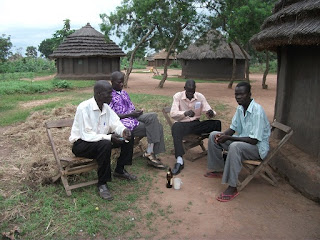The community of Metu /Moyo generally have a common locally produced alcohol called Moyo-Moyo. The Moyo-Moyo is produced by preparing cassava through fermenting, drying and pounding the cassava, once the cassava is pounded; it is mix with water and roasted on fire. The roasted substance is socked in water and mix with yeast to ferment for at least three to four days.
 |
The process of distillation |
It is then distilled and what people consume is the distillate; the soft drink.
Elders and youths gathered in a group at their leisure (for drinks).
Despite the side effects, many parents who brewed this local alcohol have succeeded in paying their children in school.
But since the alcohol is cheaply sold, and always available and affordable by majority of the populace (people); this has resulted into low labour production since majority of the mature and youths are involve in the heavy consumption of the drinks.
 |
Too much consumption of moyo-moyo warms temperature. Disadvantage. |
Moyo-moyo the local alcohol brewed in Moyo district/Madi sub-region has left many families separated or divorce. This is because; too much consumption of this alcohol has left many men un-functional (They can’t provide the service expected of a man) indeed, many homes have collapsed and many children are suffering as a result of separation of their parents. Many children could not go to school or afford secondary education because of the family neglects or loss of job by parents because of drinking too much of moyo-moyo.
The Madi community (people) in their birth customary rites drops the alcohol in the mouth of the child on the day of naming the child after three days for male and four days for female.
This however has been castigated by the modern parents in order to get rid of these rites in the communities.
This locally brewed alcohol was formerly used for work. It is called (Oya) and people consumed it after the fatigue (work) of the day. It encouraged high production in labour and low level of food shortage (food insecurity in homes or community). But this is a vice versa with current/todays life.
It is still hoped that, the Madi people will revive the spirit of working together to uphold their livelihood.
Prepared by
Field officer , Metu Maarifa Centre.
Jurugo Simon Drikota.

No comments:
Post a Comment